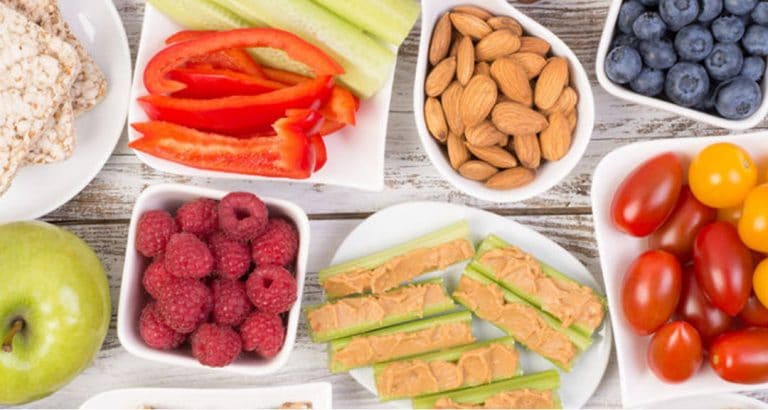Best and Worst Diets [Updated: 2022]
Did you know that the US News & World Report ranks the best and worst diets each year? The site is more famous for its lists of colleges, hospitals and cars, but they also post rankings of popular diets! Just like the other categories, the site contracts a panel of national experts to rank the best diets for specific needs – weight loss, diabetes, heart disease, etc. – and also provides a recommendation for the overall best options. Here’s the highest ranked plans, plus the top three weight loss programs!

Top 3 Best Diets Overall
#1: DASH Diet
The Dietary Approaches to Stop Hypertension (DASH) Diet was developed by the NHLBI for patients with high blood pressure. The basic concept is to include healthy foods from all the food groups, while reducing processed foods, added sugar and salt. The emphasis, then, is on lean proteins like fish and poultry, fruits, vegetables, whole grains and low-fat dairy. Calorie recommendations are based on age, gender and activity level. Experts rank this diet #1 because it is nutritionally sound, maintainable, balanced and relatively easy to follow. It is also ranked #1 as the best diet to manage diabetes and heart disease, if you’re concerned about those. If you think DASH is good an option for you, check out the NHLBI’s Guide to DASH.
#2: Mediterranean Diet
The Mediterranean Diet was a very close second to DASH in the overall rankings for best diet. The creators of this diet reason people in the Mediterranean region live longer and suffer fewer chronic diseases than Americans. So, maybe a healthy diet (plus some light activity) is key. The Mediterranean diet encourages participants to eat more fish, produce and healthy fats, while limiting red meat, processed foods and sugar. You’re free to decide how much of each food you want to include in your diet. Experts like this diet because it is balanced, maintainable, reaps long-term benefits and can help you lose weight. It also ranks well (#2) in both the diabetes and heart health categories. You can read more here.
#3: MIND Diet
The MIND diet combines DASH and Mediterranean, with an added focus on brain health. MIND stands for “Mediterranean-DASH Intervention for Neurodegenerative Delay” and has been shown to reduce Alzheimer’s risk by 35-53% depending on how rigorously you follow the plan. There are ten “brain-healthy” types of food to eat more of, and five unhealthy groups to limit. The beneficial groups are green leafy vegetables, other vegetables, nuts, berries, beans, whole grains, fish, poultry, olive oil and wine. Less healthy foods are red meats, butter/margarine, cheeses, pastries/sweets, and fried or fast food. It’s tied for number one in “easiest diets to follow” and did well in other categories too. Experts approve because, again, it’s balanced, maintainable and backed by research (in addition to being based on two other scientifically-sound diets). You can read more here.
Top 3 Best Diets for Weight Loss
#1: Weight Watchers Diet
Weight Watchers was voted the best diet for weight loss. It is a classic program that got a well-received makeover in late 2015 with the introduction of their Smart Points program. The new program continues to show that there’s more to weight loss than calorie counting, but also encourages users to develop healthy exercise and lifestyle habits. The company offers digital platforms (apps), meetings and personal coaching to help you on your weight loss journey. The plan runs on a point system (as opposed to establishing strict rules), so you can eat your favorite foods and accommodate any dietary restriction. Experts like this plan because it promotes behaviors that support both short- and long-term weight loss, is easy to follow, and follows government guidelines for a balanced diet. Read more here.
#2: Jenny Craig Diet (tie)
The Jenny Craig Diet is another plan designed to help you lose weight through portion control, diet education and a more active lifestyle. Each participant is paired with an individual diet consultant, whom you talk with at least once a week. For the first half of your program, you eat three pre-packaged meals and two snacks per day. Eventually participants transition to cooking for themselves again and learn weight maintenance strategies. Experts approve because of this diet’s balanced and long-term nature, while also showing real results with weight loss. The main criticism is its high cost from paying for both membership fees and all the pre-packaged meals. Read more here.
#2: Volumetrics Diet (tie)
The Volumetrics Diet, which tied with Jenny Craig for second place in the weight loss category, focuses on the relationship between quantity and quality of food. Professor Barbara Rolls claims that people eat about the same quantity (volume) of food each day, so the key to weight loss is consuming less energy-dense foods. If instead eating energy-dense foods like peanut butter or pastries, we favor foods with low energy-density (relatively few calories per gram) like fruits, vegetables and soup, it will help us lose weight. The experts gave this plan a thumbs-up because there’s no “off limit” foods, and it’s pretty easy to follow. If you want to learn more, click here.

3 Diets to Avoid
If you’re really just interested in what NOT to do, here you go. The bottom three scorers in the “overall” category were:
Whole 30 Diet
This highly-restrictive diet is designed to transform your life by eliminating cravings and rebalancing your body. Unfortunately, it placed dead-last in the rankings. It received this rank because it eliminates entire food groups, has not been peer-reviewed, and would be near-impossible to maintain over the long term.
Dukan Diet
This diet promises fast weight loss, even without counting calories. The theory is that protein is the key to weight loss. So, dieters follow a very strict, high-protein plan and then gradually add back in carbs like bread, fruit and veggies. Experts don’t like this diet (ranking it second to last in the “overall” group) because it is highly restrictive, unlikely to provide long-term benefits and creates a high risk of nutritional deficiencies.
Paleo Diet
The seemingly omnipresent paleo diet didn’t do so well with the experts. The idea behind this diet is that modern foods cause lifestyle diseases, so we should throw it back and eat like our Paleolithic ancestors (cavemen). No processed foods, no refined sugar… you get the idea. Experts weren’t sold on this one because of the lack of supporting research, elimination of entire food groups (grains & dairy) and highly restrictive nature.
Have you tried any of these best and worst diets? Do you think we skipped something belongs on this list? Leave us a comment below!






